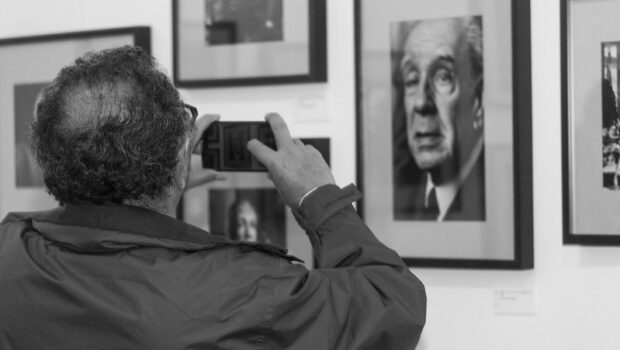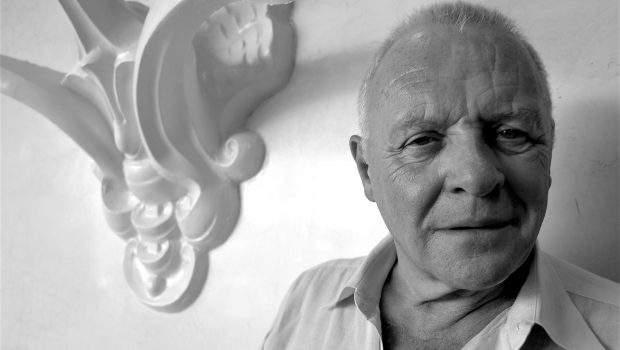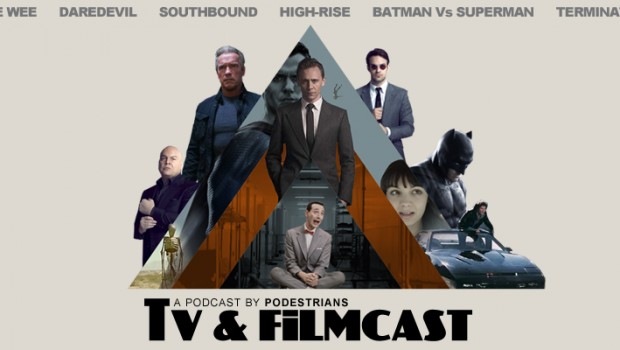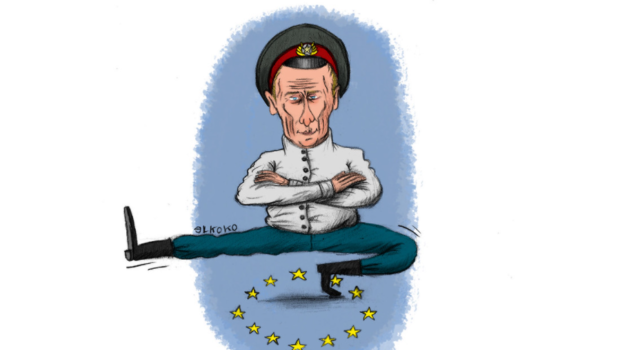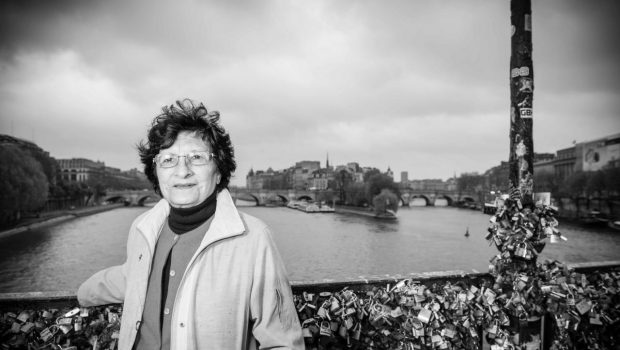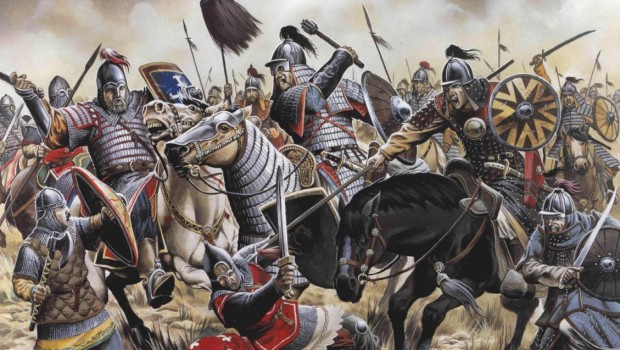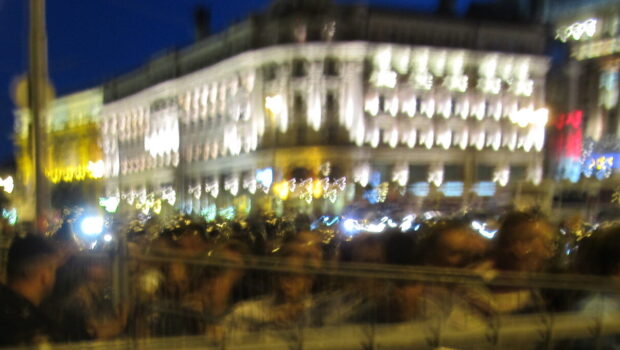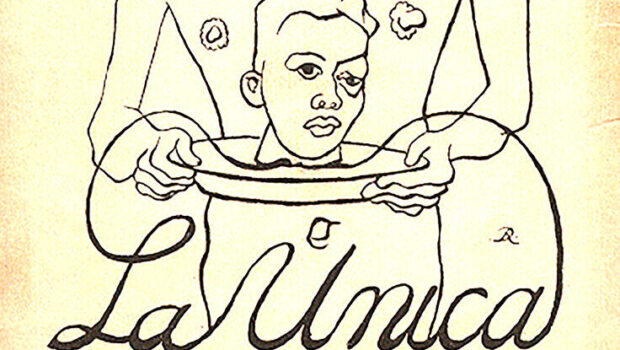Borges and the Chicanx
Daniel Chacón
Je suis ma fils mon père,
ma mère et je suis moi.
A. Artaud
They asked the Chicano questions about Mexico, Cuba and the pop idol Ricky Martin. They asked him about Day of the Dead, Cinco de Mayo and Like Water for Chocolate. He was expected to be a role model to Latino students, even rich exchange students, whom other faculty mistook for people of his own experience. Once a professor from another department called him and said she had a student from Argentina. Would he be willing to talk with him, maybe give the student some encouragement? Most international students needed little encouragement from someone like him, of a different class, a different culture, but his colleagues assumed it was all the same. He was the campus Latino, El Super Token. At a department party, the chair casually asked him to teach a class on Latin American literature in translation. “You know, a little magical realism,” she said, “García Márquez, Borges.”
This short chubby woman in her sixties was bald because of her cancer treatment, and she had a red scarf tied around her head. The flesh of her cheeks jiggled as she talked and sagged as she listened. He liked her a lot—at times he felt a surge of love for her—and he had taken the job so far away from home in rural Minnesota because of her. She was a lesbian activist in a small town called Marshall, where they could still be shocked by such open sexuality, and she was one of the least judgmental people he had ever met. She called him Danny, a name he hadn’t used since childhood. When she spoke, her cheeks wobbled, and her eyes were focused, grey.
“Our students could use a little spice in their literary diet,” she said.
“Damn straight,” he said. “I’ll feed ‘em.”
“I could use a little more Borges in my life,” she said.
He nodded and said, “Who couldn’t?” as if he knew what she was talking about. He had never read Borges.
“Maybe next semester you could teach your single-author class on him.”
“Man!” He said, shaking his head like he couldn’t believe his good luck. “What a class that would be!”
“Hell yeah!” she said, raising her glass for a toast.
Later on that semester, he went to a bar with the young English professors. As he drank draft beer, the one who taught Victorian literature said she had heard he would be teaching a class on Borges, and she asked what works he would be using. He was watching the light sparkle on the curve of his glass, a tiny reflected version of his face, like a funhouse mirror. He shrugged his shoulders and said, “There’s so much to choose from.”
One young man, a young poetry professor, smiled and slapped the table, as if he had a deliciously evil idea. “The man’s a fucking genius,” he said.
Others agreed. They used words like erudite and brilliant. The Chicano mumbled some sweeping statement that he wished would swish the old man’s image under the rug, and then he changed the subject.
The Victorian lit professor leaned over the table, and she said she would like to sit in on a class or two.
“Me too!” said another colleague. He said, “Sure. No problem.”
The town had no bookstore, so one Saturday morning, he got into his mini-truck with California license plates still on it, and he drove two hours on a two-lane highway through cornfields and past one-street towns, to the nearest city: Sioux Falls, South Dakota, population 90,000. He went to the Barnes & Noble to buy Borges. All they had was an ultra-thin paperback of Everything and Nothing, a small collection of stories, less than one hundred pages. He held it in the palm of his hand, walked up to the boy at the counter and asked, as if disappointed, “This is all you have by Borges?”
“Who?” asked the boy.
He didn’t think the little, thin book would be enough, not to understand el gran Borges, the bard of the Río de la Plata, so he went to the gates of the university library, walked up the dim winding stairs of the stacks and checked out all he could get by and about Borges: interviews, essays, poetry. It took him three trips to carry the books up three flights of stairs to his apartment.
He read “Man on Pink Corner,” “About the Purple Land” and “The Dead Man.” But he couldn’t understand any of it, even when he forced himself to read all the way through a long, boring essay on solipsism (a word he had to look up). The old man’s words meant nothing to him. He couldn’t grasp the dates and references to dead writers. He tried desperately to enter the vivid dream, when a story played like a movie in his head. He tried to walk into “The Garden of Forking Paths,” “Nightmares” and “Blindness,” “The Lottery in Babylon,” “The Meeting in a Dream,” “Things that Might Have Been.” Erudition kept pushing him away. He felt like he was walking through a landscape of words and names and footnotes and italicized phrases in other languages.
The Chicano professor was still young. This was his first university position, and he was still developing as a writer, a thinker, a person, still wrestling with his past, still fearful of his future, still able to fall deeply into despair and depression. He decided that his inability to understand Borges was because he was too stupid. It would be worse if he tried to read him in Spanish, because he would have to look up every other word. He couldn’t read Spanish.
He remembered his father’s words, “Boy, you’re a worthless piece of shit.”
One Friday night, alone in the rural town, frustrated with Borges, he had nothing to do, so he went to a university football game. He arrived during halftime, while the marching band was taking the field. They wore brown uniforms, and their white band hats shone under the stadium lights. The PA system announced that they would play a song called “Pachuco.” How ironic, he thought, being so far away from the Southwest. He wondered how many of the Minnesotan band members knew that a pachuco was an urban Chicano, a zoot suiter, father of today’s cholo. His father had been a pachuco. As a teenager, he had been a wannabe cholo, walking with his friends through the labyrinth of city streets, looking for something to destroy, looking for a way to get drunk or high.
As these Minnesotan band members played “Pachuco,” did they know that US sailors and the police used to beat up pachucos? Did people here know the difference between a Chicano and other dark-skinned people who they rarely saw in their town? At this game, so many blonde, blue-eyed people sat in the stands that a dark-haired German stood out in the crowd. The Chicano professor definitely stood out. People looked at him as he took a seat alone in the stands. He was too different not to attract attention. One woman who looked at him was a staff member from human resources. She waved at him and smiled in that friendly rural Minnesota way.
When he had walked into the human resources office for the first time, she had greeted him with a “Hiya!” Her thick Minnesota accent reminded him of the movie Fargo. He told her he was a new employee.
“Great!” she said. She asked if he was hired by maintenance.
He said no, that he was a professor of English.
“Isn’t that exciting!” She said, like she was happy for him. She helped him fill out his retirement papers.
Now, she and her husband watched the marching band play “Pachuco.”
The song had an up-beat tempo, a swing tune from the Big Band era, and the band members marched in precise lines across the glowing green field. When two lines of marchers arched like caterpillars in opposite directions, they became two pulsing circles that slithered down the field like the infinity sign. The bleachers were only a few tiers high, like at a high school, so the maneuver didn’t look as spectacular as it might have looked from the sky. But he liked the green of the field, so bright and so vast in its perfect geometry, and he liked how the marching band helmets shone so white.
Quite frankly, their playing was amateurish, like a high school marching band. The best players left a clarinet behind, which squealed like a child trying to keep up with his parents. The university was on the edge of town, across a field of tall grass on the great Midwestern prairie, treeless for miles. When the wind came across the plain, it blew hard. It almost blew the tubas from the arms of the players, their instruments wobbling in the wind. They held onto those fat, brass bodies like they were giant helium balloons at the Macy’s Thanksgiving Day parade, pulling them back down to earth, keeping them from flying away.
He tried to block out the band, the crowd, the field.
He pulled out the pocket-sized paperback of Everything and Nothing that he had bought in Sioux Falls. He tried to read, but this gathering distracted him, so different from football games back in California, where Chicanos and Asians and Blacks sat in the bleachers, and where he and his cholo friends stood around smoking cigarettes, away from the lights, next to a chain-link fence.
It felt strange to be a part of the crowd yet apart from it, as if he were glimpsing into another world. A few tiers in front of him three blonde girls with bobbed hair were watching the band. One of them pointed to a tuba player, who wobbled on the field. She giggled and said, “That’s him! That’s Jeremy.”
The other girls giggled. The one who had pointed at Jeremy wore a jean jacket. On the back was a large red, white and blue patch, a peace symbol, like something from the 1970s, although now in the 2000s the symbol’s value was retro fashion. Still, this could look like the late seventies, he thought. If his peripheral vision blurred—as if he were looking through a tunnel into another time—and if all he saw were these three girls, this could be like when he was in high school. He had gone to the football games. He used to smoke pot under the bleachers. Back then, he wore a faded jean jacket, frayed at the sleeves, and it smelled sweet, like old denim, and on the sleeve he had a patch, Chicano Power, brown fist and all. It wasn’t sewn on, because his mother wouldn’t do it for him since she didn’t like the patch. She thought it would get him into trouble, that racists would jump him. He stuck it on the arm of the jacket with masking tape, and it often fell off, and he had to push it back on and press hard against his arm until it stuck again. His hair was past his shoulders, straight and black, and his girlfriend was white. Eventually she sewed on the patch for him.
He watched the lady from Human Resources walk over to the girls. She spoke with them and gave one of them money, presumably her daughter. The mother’s hair was cut in that same style: a short, blonde, rural-Minnesota bob. When the mother was a teenager, she could have been sitting where her daughter was sitting, pointing to a band member she had known. The mother is the daughter and the daughter is the mother.
The band blared percussion and brass. Borges, he told himself.
He didn’t care who won the football game and only showed up because as a tenure-track faculty member, he would be seen by university administrators. It would show that he supported the school and was involved with the community. The chair of his department had told him that if he went to a football game, he should save the ticket stub and put it in his tenure review file.
He opened his copy of Everything and Nothing.
As the girls giggled, as the band brayed, as the Minnesota wind blew through the bleachers, he read.
At first he thought that all people were like him, but the astonishment of a friend to whom he had begun to speak of this emptiness showed him his error and made him feel always that an individual should not differ in outward appearance.
Suddenly, Borges’ words lit up on his face. He felt as if he were meant to read that passage right at that exact moment. The language carried him into the entrance of this story, allowing him inside the Borges dream—no, more. It was pulling him inside the dream. Entering the landscape, this other reality, he saw, inside a cottage at night, a man sitting forlornly on his “second-best bed.” Shakespeare at first “thought all people were like him!” Shakespeare—empty, without identity—hid his despair “in the subtextual corners” of his famous plays. That was what this story was about, and Borges must have done this with his own writings, hid himself in the shadows of language. The story was about that!
He understood that this story about Shakespeare was about Borges, his despair.
A tuba groaned.
The three girls giggled, and the lights went out on the pages and came up again on the football game. He tried to read on, but the wall of language kept him out. He was in darkness again, and there he stood, a book with only words in his hands, like in James Joyce’s “Araby,” a creature driven by vanity. Below him, the three girls giggled at the slow moan of the tuba.
***
His family was surprised when he told them he was moving to Minnesota. “Have you seen the movie Fargo?” they asked him. He told them that he was hired to teach at a university, and it occurred to them that all his years of college might lead to something other than an excuse not to get a job. His father was so happy that he told his son, “Maybe you’re not a complete dummy.” They had been proud of him being a student, but that life had lasted too long for a working-class family: ten years, during which he was always broke. His mother died when he was still a waiter, before he even got his bachelor’s degree, which took him over eight years because he worked long hours and was involved in Chicano activism.
Earlier in time, when he was in junior high, his family was certain that he would end up in prison or dead. His father always said so. When he was in junior high, he often walked onto his block and saw a police car parked in front of his house. He knew that inside the living room a cop sat with his parents on the couch, waiting for him to get home so they could question him or book him or both. He often sat on the curb hidden by an oak tree, alone, watching his house, watching shadows pass by the windows: his mom, his brother, the police. He would rest his chin on his shoulder, the sweet smell of old denim soothing his spirit.
In seventh grade, he sold pot in the boys’ bathroom, sweaty eager white kids surrounding him as they held out dollars and said, “Me next.” He got arrested by the fire marshal for selling M80s, quarter sticks of dynamite. His father grabbed him by the neck and pushed him against the wall. “I ought to hang you by the balls!” he said.
His father, who had tattoos up and down his arms and on his chest, used to walk around the house in a tank top undershirt, colloquially called a “wifebeater.” He acted big and mean to his son, because he was trying to teach him to be someone. His father figured that by telling his son over and over how worthless he was, what a piece of shit he was, how he was good-for-nothing and occasionally beating him, the son would try harder not to be worthless. When his father used the belt, the boy lay scrunched up on the floor, afraid to look up at those angry eyes, at the way his father tightened his lips around his teeth as he whipped him. Sometimes when his father passed him in the hallway of their home, he would raise his hand and hit him and call him an idiot.
After almost flunking out of high school, he had nothing else to do, so he went to community college. Something happened to him there. He suddenly liked studying. He made the dean’s list without trying. He transferred to a university and got a B.A. in Political Science, an M.A. in English and an MFA in Creative Writing. He got a book contract for a collection of stories. His family was proud. And although they had come to accept the surprise of his “success,” to him it felt new and strange, even surreal. When he went home to visit once or twice a year and he sat with family around the Christmas tree or around the table drinking weak instant coffee, he rose out of his body. Sound stopped, and he observed his fam- ily members’ gestures as if he were in a time bubble floating by the scene, watching the present from the future or from the past or from some eternal place, like the teenager sitting on the curb looking through the glass of his house, until bang! he heard words again, and he smelled beans and salty pork. He was part of his family again, back at the Formica-topped table crammed into the kitchen.
Recently he visited Fresno from Minnesota, and his father took him to a Chicano pachanga, a big party. “Come and see real Chicanos,” he told his son. “You could write about it.”
Three generations of urban Chicanos—pachucos, cholos and gang bangers—gathered in someone’s backyard in one of Fresno’s poorest barrios. Each generation had tattoos: the one-armed man playing horseshoes; the shirtless viejitos sitting on lawn chairs, drinking beer; the sleepy-eyed teenage boys with tattoo letters on their necks or dog paws tattooed on their foreheads, claiming their allegiance to Los Bulldogs con safos y qué. And all generations smoked yesca, marijuana, except for his father and him. But they both drank a lot of beer from the keg. With a Styrofoam cup in one hand and his other arm around his son’s shoulder, his father led him around the backyard and introduced him to his compadres and the children and grandchildren of his compadres. He said, “This is my son. He has a book. He’s a professor in Minnesota.”
He wanted his father to stop mentioning the book and the job, because he was certain he was the only writer there, the only professor among upholstery workers and janitors and the unemployed, and he didn’t want to appear different.
“Don’t, Dad,” he pleaded. “Stop saying I have a book.” His father looked him in the eyes, as if facing his own reflection in the mirror. “But I’m proud of you,” he said.
He wrote and published stories, but he often felt like a phony, like he didn’t belong at the university or in the pages of literary magazines and would be better off, or at least more at peace, if he were a worker like his father and had kids and was married and drank beer from Styrofoam cups and, mostly, living in Fresno and having parties in backyards which overlooked alleys with stray dogs. He doubted the veracity of his intellect and thought that maybe he had fallen through Affirmative Action cracks.
***
After the football game, he walked forlornly up the three flights of stairs to his attic apartment. Borges books were stacked around the living room, against the walls, on the tables, on the TV. He began to reread Everything and Nothing, hoping that the feeling of understanding that had touched him at the football game would return, but nothing. Everything was nothing. He read Norbert’s analysis on Borgian language, in which he argues that Borges, seeing circular time, captures the eternal artistic soul, “the Source,” he calls it, which the artist receives through color, image and sound. Every detail— since it contains God—has the same qualities as Borges’ “Aleph,” a point in space that simultaneously contains all images, outside of time, all times spinning around like subatomic particles. Norbert uses an example of an Aleph-like detail that he found in multiple works of literature and visual art: a single tree on a hill. That eternal tree is seen from so many perspectives by so many artists that to see all of them at once would be like seeing the tree spinning around and around, like a star, like sparkling geometry, crystalline, precise, an Aleph. Around the spinning image, generations of writers and artists gather, but they stand outside of time.
The Chicano let the book slide down his chest. He didn’t get it. He didn’t want to get it. It was boring. His eyes got heavy. He dozed off for a few seconds. He saw, in flashes of dream imagery, an endless hallway of books, like dark streets of skyscrapers in a surrealist painting. He saw himself walking the labyrinthine streets of a red city of books.
Suddenly, his eyes popped open like being pitchforked by the devil.
He saw the books piled in the middle of the floor, as if some religious cult was ready to burn them. He stood up, threw the books on his desk into the pile and looked around for matches, as if he would light them, but he was barely coming out of a dream. He felt anger, and he needed to do something to that pile of books on his floor, something. He heard a bang on his window, a branch from a giant tree hitting the glass. The wind outside shook the branches. He opened all the windows in the four directions of the apartment. The wind was mad. The wind blew papers off his desk, blew his hair in a mess, slapped the Chicano Movement posters on his walls against the walls. Sand was coming in from the screen, dirt was coming in, the spirit of earth was swirling in the air like imps, like the demons Herod invokes with violas in L’enfance du Christ. He stood before the pile of blowing books, pages flapping, his Indian nostrils taking in the burnt smell of corn from the processing plant.
“I hate you!” he yelled at the pile, picturing Borges on the floor in a fetal position, and he kicked the old man in the ribs, books flying around like dying pigeons.
Borges was a bourgeois bastard who didn’t care about the people. The Chicano was involved with the Movement, and he knew that Borges remained silent throughout the Dirty Little War in Argentina, when thousands of young people disappeared “for questioning” by the government and never returned. It seemed Borges cared little about the oppressed, let alone the revolution. Borges wasn’t in love with justice, he was in love with metaphor. Can metaphor save the oppressed? Is metaphor, like bread, for the people?
Fact: Borges’ father was a writer. And although the elder Borges got little recognition and published only one book, El Caudillo—which he distributed for free among friends—to be around words and books as a child could not but make Georgie at home among words and books and ideas in books. The Borges family traveled to France and Switzerland, where they settled for a time, and Georgie learned German and French, in addition to his two native languages, English and Spanish. Georgie spent hours in his father’s library, randomly pulling books from the shelves. He read on an overstuffed armchair in the study, as the other children played outside his window, yelling out their games, their laughter, which he was accustomed to ignoring.
The Chicano’s childhood was made up of streetlamps and dogs. His father watched the evening news before falling asleep shirtless on the couch. The Chicano child didn’t read, unless he was forced to by those kindly, sinister beings: public school teachers. He read books like Danny and the Dinosaur and Sneeches. When he was a teenager, he still hated to read, preferring to get stoned and drink bottles of wine on the banks of the city’s dry canals. He liked running across freeway overpasses and throwing rocks at the cars that passed below. He liked to watch TV reruns of Bewitched, Lost in Space, The Land that Time Forgot.
***
Now, in his apartment in rural Minnesota, he walked in a circle, around and around the pile of books, and then he walked through all the rooms of his apartment: the bedroom, the dining room, the living room. He walked past the bad breath of open windows, feeling his momentum rise, wanting to feel some swirl of energy that might make him so alert that he would understand Borges. But nothing happened. He slumped in his armchair and tried to read Borges, but he couldn’t focus on the old man’s words.
As the wind blew his hair, he read “The Library of Babel.”
“When it was announced that the library contained all books . . .”
Sometimes as the Chicano read, the universe faded away. The armchair where he sat, the shelves of books lining his walls—it all disappeared—and he entered the world of the book. He walked into the vivid and continuous dream, like a movie. No! It was more than a movie playing in his head, because fiction that only goes from scene to scene is voyeuristic, Cortázar said, or as Malamud wrote, metaphorically thin. He liked the slow part of reading, to stop on images, like they were paintings in a museum. The Chicano liked lingering in the landscape. If he saw a yellow flower while reading, he wanted to smell it, he wanted to caress a fat, eternal cat. He remembered walking with a murderer and a fool into an underground labyrinth of cold stone. The fact is the Chicano professor loved to read.
Reading was like entering different rooms of a house, where walls could rise up around you and then dissolve into a mountain range or a tree on a hill. Yet, all he could do with Borges was peek inside a blurry window or a dark doorway into the room, never able to enter, maybe because he feared too much as he read Borges, feared being stupid, not good enough, unworthy to receive the gift of art. He was an imposter. He had no right to be a professor!
That night trying to read “The Library of Babel,” he was continually pushed out of the story. All he saw were words and symbols all around him, as if language were a tarp keeping him in the back of a pickup truck. He remembered the video images of the Riverside County Sheriff deputies beating the farm-working Mexican lady with their clubs, over and over again. There must be a literary counterpart to that image, some archetypal meaning for him in relation to that image. The cop’s billy club is Borges’ language.
The Chicano put down the book. He hadn’t understood a word.
He fell asleep.
What happened next was the dream. This was the dream that finally did it. It was in that world that he finally got a glimpse of Borges.
He dreamed a mob of books was closing in on him, like evil trees in a magic forest. Some laughed, some sneered or mocked him. He found himself pressed against a chain-link fence, threatened by giant copies of Parallel Lives, Confessions, The Idiot.
He screamed and the scene changed, and he saw an old man standing before a mirror, reading a thin book, laughing. He approached closer, but in the reflection of the mirror, he saw his own Indian face staring back at him.
But here’s the thing: It wasn’t him in the mirror, not the present him, not the Chicano professor in rural Minnesota, but him as a teenager, long hair and denim jacket with a Chicano Power patch.
The old man was engrossed in the book he was reading. That was when the dreamer saw the book’s title, the Chicano’s book, the publication of which had gotten him his university position.
It was a thin book. So light. All that work and it was so small. The first time he saw it, he held it in his hands like a sick bird. “This is it?” he said to himself. “This booklet is my book?”
Now, reading the Chicano’s book, Borges chuckled.
The Chicano knew he wasn’t good. The Chicano knew what the Chicana poet Lorna Dee Cervantes called “that nagging preoccupation that I’m not good enough.” His work had no place in any library. He was a joke. To think he could write something worthwhile—how näive! And to think of Borges reading his book. He would think reading it a waste of time. But the Chicano had to write. He, frankly, had no choice, because if he didn’t write, what else would he do? He’d have to get a life, maybe start a family, and perhaps that scared him more than anything else.
He looked at Borges looking into the mirror. What do I do? I want to understand you. I want to write.
“I’m like you,” said the old man. “I want to understand me.”
“What do I do?” “Nothing.”
Borges closed the book. He put on his glasses and strained to see the Chicano writer, but he was blind and could only see blurs, a formless face.
“Thanks, Chicano,” Borges said. “You’ve been a great influence on my work.”
“But I came after you.”
“Don’t be so linear. If it weren’t for you, I would have never written Everything and Nothing.”
“I’m . . . I’m the Shakespeare character? It’s based on me?” “Don’t flatter yourself. I mean that this story you’re writing now, or this essay, or this whatever-you-call-it, these words you weave are giving me an idea. Follow me.” “Where are we?” the Chicano asked, looking around as they entered the orange city at night, where skyscrapers were made of books.
“How would I know?” said Borges. “Am I the dreamer or the dreamed?”
A starry sky appeared above their heads. They stood at the edge of a lit-up football field, so green, and the band marched like tin soldiers on the horizon, but all was silent, and the stands were dark and empty.
“I loved that thing about the football game,” Borges said. “That’s why you got chills, because I understood what you saw.”
“But . . . What did I see?”
“Savant l’enfant qui sais qui’l est son père.” “But . . .”
Borges opened his mouth and out came a ring.
The phone rang. Sitting on a coffee table. The Chicano stood up, walked across the hardwood floor and picked it up.
“Hello?”
“Hi, Danny. I called to ask how your classes are going.”
It was the department chair. “Are you finding yourself adjusting to life in Minnesota?”
“Yeah. How are you?”
“Well, you know . . . the treatment leaves me feeling like shit. But other than that . . .”
“Hey, look,” said the Chicano. “You want to go get a beer?”
“Uh, yeah, that sounds good,” she said.
He pictured the red scarf around her head, billowing in the Minnesota wind.
***
The next time he delved into Borges, he didn’t look for meaning or expect the form of the stories to fall together in a way that he could explain to students; rather, he entered the unending rooms of his imagination, his own imagination, looking for Borges. He knew that beyond all the words and italics and the apocryphal scholarship was a lonely old man who liked to talk, who liked to walk, a solitary man for whom solitude was unbearable, a man who hid himself, his soul, in the sub-textual corners of the work. All you had to do was enter into the place where language is made, and his spirit would be released into your spirit. The Chicano glimpsed him reading under a 100-year-old oak tree. And many times, when he caught up with Borges, he also found himself, the boy with the jean jacket, Chicano Power patch shining like hope on his sleeve. They hung out in walled gardens, walking, talking, sometimes reading aloud to each other, Borges and the Chicano.
©Literal Publishing. Queda prohibida la reproducción total o parcial de esta publicación. Toda forma de utilización no autorizada será perseguida con lo establecido en la ley federal del derecho de autor.
Las opiniones expresadas por nuestros colaboradores y columnistas son responsabilidad de sus autores y no reflejan necesariamente los puntos de vista de esta revista ni de sus editores, aunque sí refrendamos y respaldamos su derecho a expresarlas en toda su pluralidad. / Our contributors and columnists are solely responsible for the opinions expressed here, which do not necessarily reflect the point of view of this magazine or its editors. However, we do reaffirm and support their right to voice said opinions with full plurality.
Posted: March 27, 2024 at 9:54 pm


